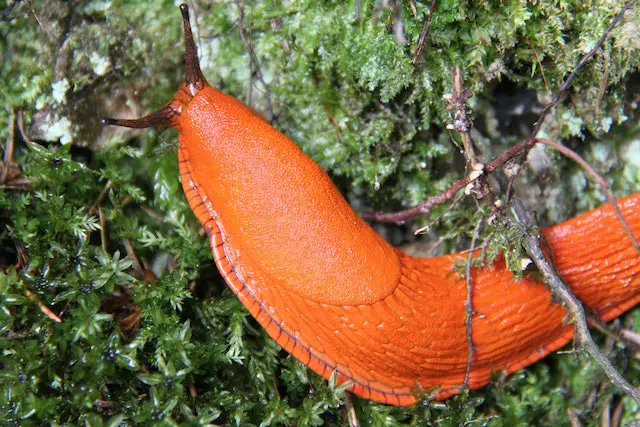Slugs are common in North America, but the question is: “Are slugs good for plants?”
Slugs are very good for plants. They are important ecologically because they eat decomposing vegetation. Besides, sorts of insects, mammals, birds, slow worms, and earthworms feed on slugs.
If you completely remove slugs from your backyard, you might upset the natural balance, harming your garden’s ecosystem.
Slugs are also beneficial because they help decompose dog excrement and dead animals.
Are Slugs Good For Plants?
Slugs can be good for plants with one caveat. That is slug management. So, slugs can be good for your garden as long you manage the slug population.
Slugs help plants by breaking down dead plant matter into nitrogen-rich fertilizer. Therefore, slugs are good for plants by enhancing soil nutrition. The way worms improve compost, so can slugs help your plants thrive.
Slugs also serve as a food source for birds, toads, snakes, and insects.
Related posts:
Are slugs good for anything?
If you are dealing with slugs in your backyard, you might ask: “Are slugs good for anything?” Slugs can be good for your garden as long as they aren’t invading it in large numbers.
One of the biggest benefits of slugs is they break down garden debris. And slugs break down organic matter. They turn it into nitrogen-rich fertilizer that enhances the soil. So, slugs, in essence, improve soil nutrition.
As an indirect benefit, slugs serve as a natural food source for many beneficial birds, frogs, toads, snakes, and insects.
Signs of Slugs in Garden
There can be many signs of slugs in your garden, such as shiny slime trails across foliage and large, irregularly shaped holes in leaves.
These soft-bodied garden pests will eat almost any type of plant matter. But, their favorite food is tender new growth. In the vegetable garden, slugs target tomato fruits and the leaves of salad greens along with newly emerging seedlings.
Look for telltale signs of slugs in the spring since that’s the time of year when they emerge to lay their eggs near the soil surface.
Slugs may be brown, orange, black, or gray, ranging from 1/2″ to 5″ long. After overwintering in the soil, adult slugs emerge in the spring and lay hundreds of Young slugs, feeding close to where they hatch but slowly moving throughout a garden.
Look for increased slug activity at night and in cool, wet weather. You will find fewer slugs in your garden when it’s hot and dry.
How to get rid of slugs naturally?
Fortunately, you can get rid of slugs naturally. Gardeners can choose from various organic and natural remedies to control slugs.
Natural methods can be effective in getting rid of slugs in your garden, but they aren’t guaranteed to fix your slug problem. But, at the very least, natural methods will help reduce the number of slugs in your yard.
Slug Repellent Plants
Aromatic plants and herbs, such as rosemary, are effective slug-repellent plants.
Some of the best slug-repellent plants are:
- Black-eyed Susan
- Marigolds
- Rosemary
To deter slugs, it’s best to plant these on the edges of your garden.
Other plants such as viola, astilbe, campanula, ranunculus, lobelia, and phlox are less affected by slugs or resistant.
In general, slugs dislike plants with waxy, hairy, or glossy leaves. Slugs will also avoid plants with strong-smelling foliage, such as lavender.
What do slugs eat?
Slugs eat organic matter, including fungi, plant leaves, earthworms, stems and roots, plant debris, and decaying matter.
How to get rid of slugs?
You can choose from a variety of effective methods to get rid of slugs.
Get Rid of Slugs with Copper Tape
Copper is a natural slug repellent. It is believed the slug’s mucus reacts with copper in a way to create small electric shocks.
Place copper tape around the areas with slug activity to test this slug control method. You should clean the copper tape regularly to avoid tarnishing.
Get Rid of Slugs with Eggshells
Use crushed eggshells to get rid of slugs in your garden. Slugs will avoid areas with crushed eggshells. This is an effective way to control slugs in your garden because these pests don’t like to cross areas with sharp edges.
Use Beer to Get Rid of Slugs
Slugs dislike the smell of beer. So, if you don’t mind sacrificing some of your beer, you can use it to repel slugs in your garden. Burry a beer bottle about three inches in your garden, half filled with beer.
The slugs will fall into the beer bottle. While this method works, it’s not the most effective for a large slug invasion.
How to get rid of slugs permanently?
You can get rid of slugs permanently if you plant herbs and plants slugs dislike. Slug-unfriendly plants such as lavender and rosemary will help you permanently eliminate slugs.
But it’s not a good idea to completely eliminate slugs from your garden. Slugs may not be popular, but they are important to maintain the natural balance, harming your backyard’s ecosystem.
Slugs are also beneficial because they help decompose dead animals and dog excrement.
